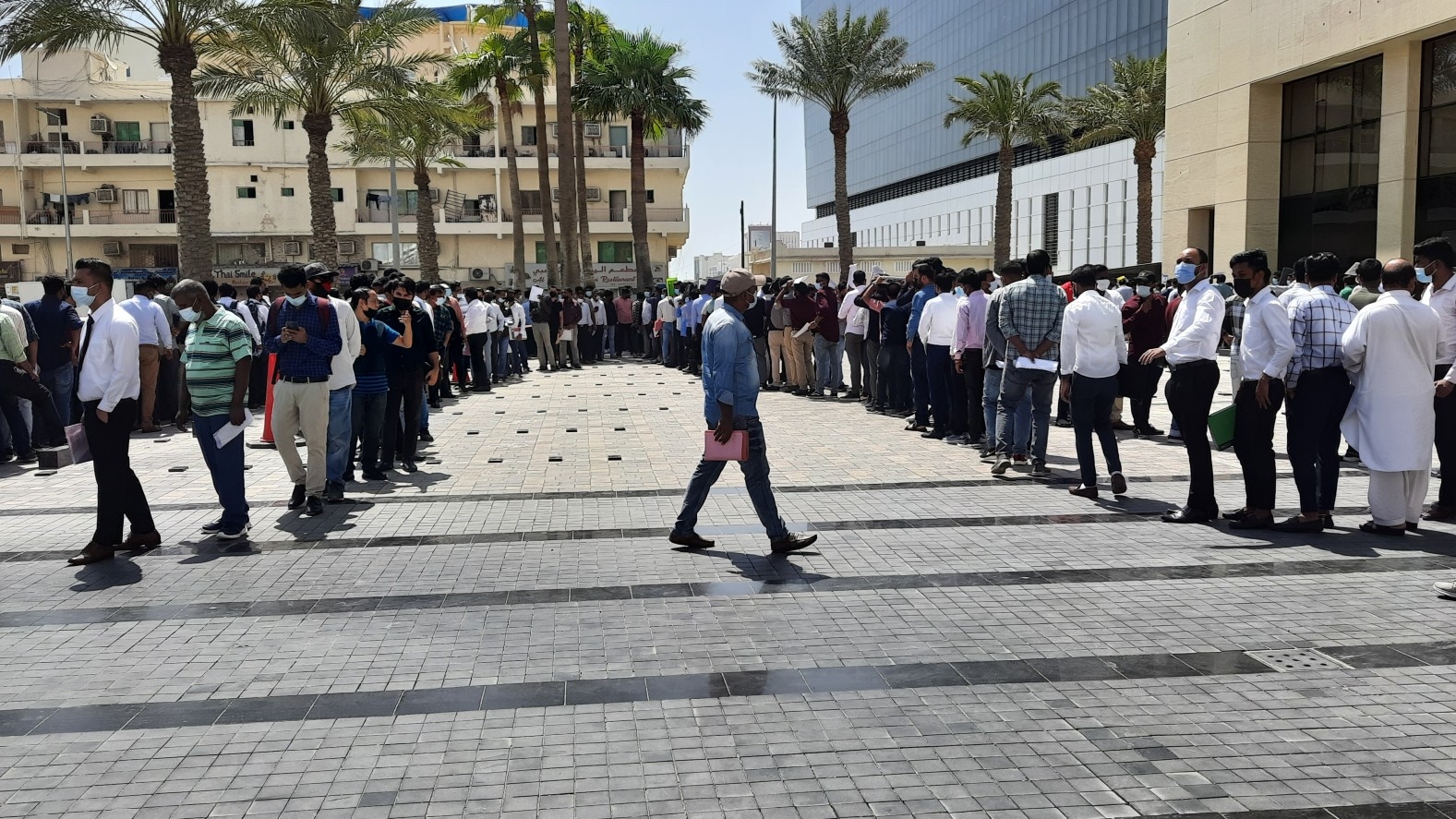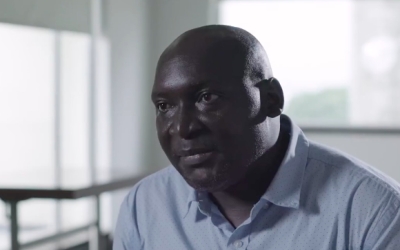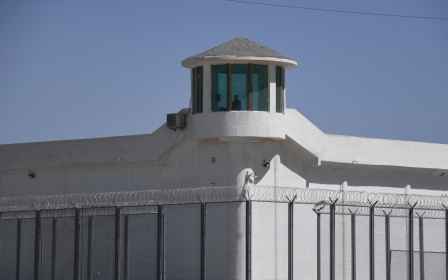World Cup 2022: Football-loving workers fear exploitation in Qatar gig economy

Thousands of unemployed expatriates in Qatar wake up every morning to their mobile screens, hoping to find a "Fifa job".
Most of these jobs have a distant connection to world football's governing body. The candidates know what the category really entails: a role that won't last more than a few weeks.
For some young football-lovers, involvement in the World Cup, which kicks off on 20 November, is a case of bragging rights and a prestigious feather in their cap.
That’s why many of them heeded Fifa’s call in March for 20,000 volunteers at the tournament, with no previous experience required.
But the reality for those applying to last-minute paid opportunities is that they’ll likely be far away from stadiums and footballers. They could instead find themselves in tough working conditions, struggling to rein in crowds on subways and roads.
New MEE newsletter: Jerusalem Dispatch
Sign up to get the latest insights and analysis on Israel-Palestine, alongside Turkey Unpacked and other MEE newsletters
With loans to pay and living costs to meet, the scramble for jobless workers to find short-term work ahead of next month’s tournament is on.
Boom in short-term jobs
Qatar has become a hub of temporary jobs in recent months, with several multinational companies and state institutions advertising World Cup vacancies.
In June, hospitality partner Accor said it needed 12,000 overseas workers for the 65,000 rooms in apartments and homes it is operating.
CEO Sebastien Bazin said hiring was underway in Asia, Africa, Europe and South America for housekeepers, front-desk staff, logistics and experts.
'For a hundred vacancies... a crowd of 3,000 gathered from 6am and stood under the sun until noon'
- HK, foreign worker
"All that is going to be dismantled at the end of December," he said at the time.
Qatar also sought an unspecified number of workers from Nepal to fill vacancies in the service sector.
Unemployed men in the Gulf state showed MEE hundreds of messages calling for short-term workers shared on Whatsapp groups, run by community organisations and activists.
Most of these groups sprouted up at the start of the Covid-19 pandemic two years ago, when thousands were laid off.
A young community leader told MEE that 17 job-related messaging groups and Facebook pages he was involved in were used by over 50,000 people last year.
“A job is better than no job, but we shouldn't overlook the exploitation,” a journalist who covers the gig economy in Qatar said.
HK, who only gave his initials, is one of those unemployed foreign nationals checking his phone constantly for new opportunities.
He borrowed QR7000 ($1,923) for flights, quarantine and documentation to return to Qatar in July last year, after going to India to attend his sister’s wedding.
Upon his return, he worked as a clerk at the health ministry’s Hamad Medical Corporation, managing clinics in quarantine hotels.
But when quarantining was ended by Qatar’s government in September, he and 2,000 colleagues lost their jobs.
Now he’s facing hurdles in the pursuit of shorter-term roles associated with the World Cup.
"I attended six interviews, all Fifa-related. Some recruiters keep us waiting for some time and then call to sign a contract," HK said.
One of the roles required him to commit for two months, but promised only 12 working days at QR250 ($69) daily.
During a walk-in interview for another role, at Qatari conglomerate Ali Bin Ali, HK encountered chaotic scenes.
“For a hundred vacancies in their sales team, a crowd of 3,000 gathered from 6am and stood under the sun until noon,” he recounted.
“Then the recruiters halted the interview fearing police intervention, and asked the candidates to leave the premises after submitting their CVs.”
Some newly recruited workers told MEE they were “generally happy”, except for the short length of the jobs. Most temporary jobs, they said, offered two or three times more than the Qatari minimum wage.
Fears of being deported
While reports suggest organisers face a personnel shortage ahead of the 1.2 million expected visitors for the tournament, no stakeholders in the temp-hiring business were willing to share just how many workers were needed.
MEE's questions to Fifa, five recruiters, and six HR consultancies who regularly post temporary vacancies were unanswered.
Qatar's population reached 2,985,000 in October, excluding nationals and residents abroad, with 370,000 additional people arriving in the last year.
But the latest unemployment rate of 0.26 percent does not appear to reflect reality on the ground.
Many workers have a "free visa", a legal grey area in which they are technically employed by companies but, in fact, jobless or freelancers. Some of these employees are fed and housed when there’s no work, but do not receive a salary.
Then there are workers who have been let go by companies, but are allowed to retain a visa under those firms until they find a job.
Foreign-born labourers in these insecure roles, many of whom are struggling to pay off debts accrued to get work in the Gulf state, worry they’ll be sent back to their home countries.
Last year, there were reports that foreign workers would be sent away and placed on five months' unpaid leave so they were not visible during the tournament.
One candidate said that some recruiters demanded passports as a bond after interviews, an illegal practice in Qatar.
"Companies fear recruits will jump when offered a higher salary. There's talk that the wage will increase in the immediate days before the World Cup," he said, adding that securing passports was an easy solution to prevent the jump.
"Many submit their education certificates instead of passports just in case."
Qatari officials and Fifa did not respond to MEE’s request for comment on whether they had heard about such abuses.
Rothna Begum, senior Middle East and North Africa researcher at Human Rights Watch, said that her organisation found abuses against construction workers, but hadn't received any abuse cases from service workers hired on temporary contracts.
"Of course, there's a difference if you work for an SC [Supreme Committee] related job where you have better worker welfare standards and programmes that can benefit you,” she told MEE, referring to the official World Cup organising committee.
“But if you are not with the SC, they don't apply. And most workers don't fall under the SC remit.”
Middle East Eye delivers independent and unrivalled coverage and analysis of the Middle East, North Africa and beyond. To learn more about republishing this content and the associated fees, please fill out this form. More about MEE can be found here.






